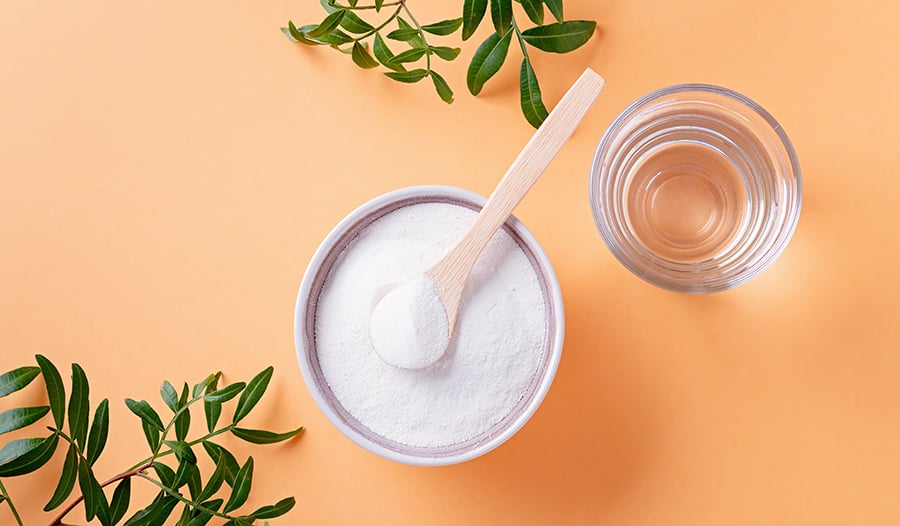Vegan Collagen: Benefits, Boosters, and Tips from a Registered Dietician

Collagen has become all the rage lately, with promises of reducing aging and keeping people looking and feeling youthful. You've likely seen collagen products in the makeup, skincare, or supplement aisle. But what is it, and why is it so popular?
What Is Collagen?
Collagen is the most abundant protein in our bodies. It’s found in our skin, muscles, tendons, and ligaments. Collagen is a complex protein made from amino acids such as glycine, proline, hydroxyproline, and arginine. It’s what gives our skin its elasticity and strength.
As we age, our collagen production naturally decreases. This can lead to wrinkles, sagging skin, and even joint pain. When we notice these symptoms of decreased collagen production, many of us turn to products containing collagen.
Collagen comes from the skin and bones of cattle and pigs and sometimes from fish scales or eggshells. It comes mainly from bovine, or cows', connective tissue. Marine collagen comes from fish or other marine life. Connective tissue is taken from the animal by-products and ground up into a fine powder to make the collagen we see in stores.
Once processed, collagen can be found in supplements, lotions, and other beauty products. It was first introduced in beauty products and later became popular in supplement form after consumers saw results while using beauty supplies containing collagen.
What Is Vegan Collagen?
Vegan collagen is an animal-free alternative. Often made from a type of yeast known as Pichia pastoris, vegan collagen is still in its early stages of development.1 P. pastoris is the most effective and commonly used microorganism for making high-quality vegan collagen supplements.
Currently, finding a vegan collagen supplement is tricky. Instead, you’re more likely to find a vegan collagen booster. You’ll note that most vegan collagen supplements say "collagen boost" or "collagen builder" on their packaging. These boosters and builders contain elements that help increase the natural collagen production in your body.
Although oral vegan supplements are harder to find, many vegan collagen beauty products are available. Always read a product’s ingredient list and label when looking for a vegan product to ensure it has a vegan certification and has not been tested on animals.
What Causes Collagen Loss?
Many factors can accelerate collagen loss in our bodies. While we naturally lose collagen through aging, certain environmental factors and lifestyle choices also decrease collagen.
Exposure to the sun’s ultraviolet (UV) rays causes skin damage and, over time, will reduce the skin’s ability to produce collagen. This is one reason why you should always wear sunscreen.
Collagen also impacts our bones. Collagen in the skeleton system becomes less reliable as we age, leading to decreased bone strength.2
Other lifestyle habits, like smoking cigarettes, drinking alcohol, and even eating excess added sugar or ultra-processed foods, can negatively impact collagen production and damage the body’s repair mechanisms.
Collagen Production
Our bodies naturally produce collagen. While vegans do not require collagen supplements, adding it to your routine doesn’t seem to be any downside. Always check with your healthcare provider before adding to or changing your supplement regimen.
Upping your protein intake may help boost collagen production: eating a variety of proteins throughout the day ensures you are getting the amino acids your body needs to continue making collagen. Healthy adults should aim for at least 0.8 grams of protein per kilogram of body weight per day: that’s .36 grams of protein per pound.
Consider adding these and other plant-based proteins to your vegan diet so you can meet your nutrition needs and support your body’s natural production of collagen:
- Tofu and other soy foods
- Quinoa
- Nuts and Seeds
- Lentils, all varieties
- Beans, all varieties
Collagen Boosters
Collagen boosters are nutrients that help increase your body’s natural collagen production. Adding these boosters in combination with plant-based proteins may help increase collagen production. While more research is needed in this area, some potential collagen-boosting nutrients for vegans include vitamin C, amino acids, copper, and antioxidants.
Vitamin C
Vitamin C is one of the most important nutrients for collagen production. It helps repair and heal connective tissue.3 It is also a potent antioxidant that helps protect cells from free radical damage. Our bodies cannot make vitamin C, so we must get it from our diet.
Vitamin C is a water-soluble vitamin found in many fruits and vegetables. Good sources of vegan vitamin C include:
- Oranges
- Peppers
- Kale
- Broccoli
- Kiwi
- Strawberries
Amino Acids
Amino acids from plant-based proteins can also help build collagen. Amino acids are the building blocks of proteins in our bodies.
Proline is an amino acid that is necessary for the production of collagen. Proline can be found in foods such as soybeans, cabbage, and mushrooms. Glycine is another amino acid used to help the body produce collagen. It is found in spirulina, pumpkin seeds, and soybeans.
Copper
Copper plays an essential role in collagen formation by helping to form red blood cells, bones, and connective fibers that support tissues. It can be found in dark leafy greens, beans, lentils, nuts, and seeds.4
Antioxidants
All antioxidants are important in collagen production because they help keep your cells healthy and protect against free radical damage. Some good vegan sources of antioxidants include blueberries, goji berries, and acai berries.
How Does Vegan Collagen Work?
Vegan collagen works similarly to non-vegan collagen supplements. When you take a vegan collagen supplement, the amino acids and other nutrients are absorbed into your body. These nutrients then travel to your skin, where they help boost collagen production.
You may see benefits when using collagen topically and taking a collagen booster supplement. It’s important to note that supplementation and use of vegan collagen products won’t change the composition of your skin overnight: it is a process like all good things in life.
Vegan Collagen in Beauty
As scientists develop animal-free alternatives to regular collagen, vegan collagen is becoming more popular in beauty products, like eye creams, overnight creams, and even serums. These beauty products may contain vegan collagen and collagen boosters, which help minimize fine lines and wrinkles.
Some beauty products containing vegan collagen are made from algae. Plant-based collagen boosters contain acerola cherries, vitamins C and E, and hyaluronic acid.
Health Benefits of Vegan Collagen
Vegan collagen supplements are still in the early stages of development, but beauty products that incorporate vegan collagen are widely available and offer several benefits: some that are the same as their non-vegan counterparts and some that are unique to vegan collagen. These potential benefits include:
- Younger-looking skin: Because vegan collagen can help reduce wrinkles and promote skin elasticity, it may give your skin a more youthful look.
- Reduce wrinkles and fine lines: Creams containing vegan collagen may help reduce the appearance of wrinkles and fine lines on your face, neck, and other areas of your body.
- Improve skin elasticity: Vegan collagen may improve the elasticity of your skin. This can lead to less sagging and a tighter, firmer feel and look.
- Boost collagen production: Vegan collagen products contain properties that may help increase your body's natural collagen production.
Do We Need Collagen?
Collagen plays an important role in our bodies. It is the most abundant protein and a significant component of bone, skin, muscles, tendons, and cartilage. As we age, the body’s natural production of collagen slows, and the collagen that we do have begins to break down. This can lead to signs of aging, like fine lines and wrinkles.
Having fine lines and wrinkles is a natural feature of aging, not something that needs to be “fixed.” But if they are a concern for you, know that collagen can help improve the overall appearance of your skin, giving it a more youthful look.
While animal sources of collagen are widely available, there are several reasons people may want to consider getting their collagen from vegan sources. Vegan collagen is becoming more popular as people look for animal-free alternatives to collagen supplements.
There are many ways to boost and promote collagen production in your body: diet, lifestyle and environmental factors, and collagen products. Plant foods like fruits and vegetables are vital components of your diet as they help protect collagen stores.5 As with all matters of health and wellness, it’s important for you to choose the approach that works best for you.
References:
- Báez J, Olsen D, Polarek JW. Recombinant microbial systems for the production of human collagen and gelatin. Applied Microbiology and Biotechnology 2005 69:3. 2005;69(3):245-252. doi:10.1007/S00253-005-0180-X
- Shuster S. Osteoporosis, like skin ageing, is caused by collagen loss which is reversible. J R Soc Med. 2020;113(4):158. doi:10.1177/0141076820910315
- DePhillipo NN, Aman ZS, Kennedy MI, Begley JP, Moatshe G, LaPrade RF. Efficacy of Vitamin C Supplementation on Collagen Synthesis and Oxidative Stress After Musculoskeletal Injuries: A Systematic Review. Orthopaedic Journal of Sports Medicine. 2018;6(10). doi:10.1177/2325967118804544
- Harris ED, Rayton JK, Balthrop JE, DiSilvestro RA, Garcia-de-Quevedo M. Copper and the synthesis of elastin and collagen. Ciba Found Symp. 1980;79:163-182. doi:10.1002/9780470720622.CH9
- Solway J, McBride M, Haq F, Abdul W, Miller R. Diet and Dermatology: The Role of a Whole-food, Plant-based Diet in Preventing and Reversing Skin Aging: A Review. The Journal of Clinical and Aesthetic Dermatology. 2020;13(5):38.
DISCLAIMER:This Wellness Hub does not intend to provide diagnosis...
















































































 Table of Contents
Table of Contents















